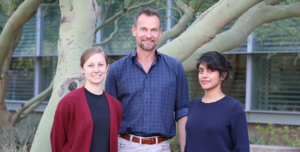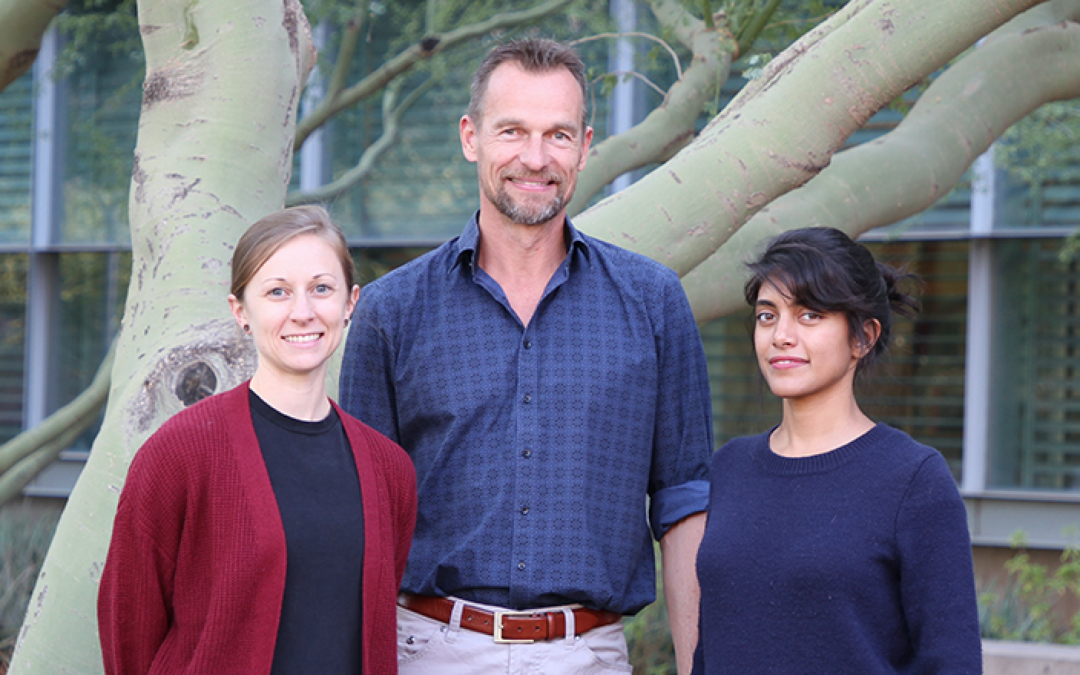Environmental entrepreneurs receive national recognition
Identified as “a powerful new model for the environmental field,” Professor Rolf Halden’s One Water One Health, an environmental justice organization, launched at the Biodesign Institute at Arizona State University , has been selected by The J.M. Kaplan Fund to receive an award of $175,000 over the course of three years.
Halden’s organization is one of three environment-focused awardees and seven additional social innovation awardees, chosen from a field of 1,354 entries from all 50 states, to receive The J.M.K. Innovation Prize. The prize honors “organizations tackling America’s most pressing challenges through social innovation; pilot projects, new organizations or nascent initiatives that involve a certain amount of measured risk, but which may ultimately lead to large-scale, transformative results.”
One Water One Health harnesses the trillion-dollar infrastructure of U.S. wastewater treatment plants in a new way to identify and then eliminate harmful chemicals that pose a threat to the U.S. environment, its wildlife and its people.
“This proposal truly focuses on an innovative and potentially game-changing approach,” said one of the Prize application reviewers, Arturo Garcia-Costas, environment program officer at The New York Community Trust. “The notion of using wastewater treatment plants as chemical observatories to identify chemicals that accumulate in ecosystems and living creatures is nothing short of inspired.”
One Water One Health scours wastewater to protect human health

As part of the newly launched One World One Health organization, co-founder, graduate research assistant and human health and nutrition expert, Devin Bowes, will focus on the environmental impact of the foods we eat. Organization founder Rolf Halden, director of the Biodesign Environmental Health Engineering Center, launched the new organization that has received The J.M. Kaplan Innovation Prize. Co-founder, environmental engineer and graduate research assistant Nivedita Biyani aims to reduce the use of single-use plastics. (Image: ASU Biodesign Institute)
“We have developed a practical and economical approach to screening consumer chemicals for both environmental persistence and dangerous bioaccumulation behavior in living organisms,” said One Water One Health founder Rolf Halden. Halden is also founding director of the Biodesign Center for Environmental Health Engineering, professor in the Ira A. Fulton School for Sustainable Engineering and the Built Environment and senior sustainability scientist in the Global Institute of Sustainability at ASU.
“We can tell sustainable chemicals from persistent, dangerous ones by observing their behavior during wastewater treatment,” he said.
Halden and his co-founders and graduate research assistants, Devin Bowes, a human health and nutrition expert, and Nivedita Biyani, a civil and environmental engineering student who graduated from the ASU School of Sustainability, are focused on improving environmental quality, human health and resource recovery.
“Professor Halden’s on-the-ground work attracts students who are eager to make a positive impact on our environment,” said Joshua LaBaer, executive director of the Biodesign Institute. “His use-inspired research drives creative thinking and the emergence of student-led initiatives that promise to make our world healthier for future generations.”
“Our environment is directly impacted by the foods we choose,” said Bowes. “One Water One Health embraces this connection and investigates the carbon footprint of what we eat with the intent to protect future generations, as well as vulnerable populations, said Bowes.
Biyani aims to make our world more self-sustaining by concentrating on resource recovery and reducing single-use plastic. “We look at waste as an opportunity to reuse and recycle valuable materials,” said Biyani.
“With this funding, our team will take on environmental pollution and environmental justice issues in a rapid, data-driven and economical fashion to protect at-risk communities and natural ecosystems,” said Halden.
“Over the course of the next three years, our team will demonstrate the use of a new sentinel technology to pinpoint environmental hazards, to inform regulatory action, and to recover nutrients and valuable metals from hazardous waste process flows,” he said.
Halden explained that One Water One Health will work with disadvantaged communities, industry and government to address legacy pollution, eliminate toxins from the chemical supply chain, and recover valuable resources from industrial process streams to protect human health and move society toward a sustainable, circular economy.
Building on success
The nonprofit initiative evolved from over 15 years of exposure assessment and public health research using municipal wastewater as a diagnostic fluid to detect and quantify harmful environmental exposures and natural resource degradation.
A notable recent victory for the team is the nationwide ban by the U.S. Food and Drug Administration (FDA) of ineffective and risky antimicrobial products that were formulated into thousands of antibacterial consumer products, and whose polluting and adverse human health effects were brought to light by using an innovative technology called wastewater-based epidemiology.
“We use wastewater as a data source to learn about toxins in our environment, valuable nutrients we flush but could recycle and food that’s good for us and the environment,” said Halden. Halden’s Center for Environmental Health Engineering at the Biodesign Institute houses the largest repository of wastewater process flow samples in the world, known as the Human Health Observatory. The Human Health Observatory provides information on chemical exposures of some 32 million Americans and a quarter billion people worldwide.
Start-up Aquavitas helps communities fight substance abuse
Last year, Halden’s team launched a partnership with Tempe’s municipal government to pilot a collaborative effort to track the presence of opioids and other pharmaceuticals and join in efforts to combat their abuse.
Halden’s team from Arizona State University and the mayor’s staff meet regularly to review incoming data and react in real-time to changes in the types and quantities of licit and illicit drugs used in the city and detectable in anonymized, composited urban wastewater. The fast, inexpensive and data-driven approach to managing substance misuse has created demand from other communities, prompting members of Halden’s research team to form Aquavitas, another ASU startup company.
Popular demand for this innovative approach to public health protection is rapidly increasing. This long-term effort, initially funded by the Virginia Piper Charitable Trust, is now the largest wastewater-based epidemiology network in the world, facilitating chemical monitoring in some 250 cities and neighborhoods across the U.S. and over 350 cities worldwide.
To learn more about the ASU non-profit initiative One Water One Health and view a short video of Halden discussing the initiative, click here.
Other awardees: Reclaiming iron oxide and telling climate stories
Other awardees in the environment-focused category include Our Climate Voices, a climate justice organization that works to humanize climate disaster through written, audio and visual storytelling and True Pigments, an organization that brings acid mine drainage impacted streams back to life by removing iron oxide and processing it into pigment that can be sold to pay for the process, create jobs in rural communities and fund additional watershed restoration projects.
“To environmental leaders across the nation, we urge you to examine the work of these innovators,” said Peter Davidson, chair of The J.M. Kaplan Fund Board of Trustees. “All ten awardees show incredible promise, and we believe the innovators focusing on the environment will not only have tremendous impact in their communities but offer lessons for the larger field.”
Prize applications drive report on social innovation
The report on this year’s Prize — Growing Grassroots Resilience — details seven overarching findings, including these that may be particularly relevant to environmental leaders:
- Climate reformers are putting people first. Some of the most powerful environmental initiatives are those that link climate change to social justice, leveraging more holistic solutions to create climate-resilient communities.
- Waste can be reimagined as a source of community value. Among places scarred by environmental injustice, innovators are digging deeply into the waste stream to restore ecologies and rebuild economies.
- Public health initiatives are being reframed as social medicine. Across the Fund’s program areas of social justice, the environment and heritage conservation, more than 1 in 5 applicants referenced health or health care, pointing to a convergence of cross-disciplinary innovators who are linking health, place and community empowerment.
- Government is not the enemy of innovation. Many applicants are enlisting public institutions as partners in social innovation, with a significant percentage of applications referencing government as well as policy or legislative efforts, emphasizing the role that government can play in catalyzing new solutions to social challenges.
- The list of all ten 2019 J.M.K. Innovation Prize awardees across immigration, justice reform, environment and historic preservation is available online.
Open Call to Arizona Funders to Connect with Innovators:
For the first time, The J.M. Kaplan Fund is opening up its database of applications to funders across the nation and around the world, inviting them to tap into the innovative ideas and individuals that may spring from their own communities or be related to their program interests. There are 1,300+ innovative ideas from this round that have considerable merit, and the Fund is eager to help connect them with resources and opportunities. Funders interested in receiving additional information about innovators in their communities and program areas should contact: Justin Goldbach, Program Director, The J.M.K. Innovation Prize, [email protected]
In the coming months, The J.M. Kaplan Fund will also be holding a series of webinars for funders interested in learning about innovations in each program area. Funders interested in joining those conversations should also contact Justin Goldbach.
About The J.M. Kaplan Fund
Established in 1945 by philanthropist and businessman Jacob Merrill Kaplan, the Fund has since its inception been committed to visionary innovation. Over its 72-year history, the Fund has devoted $250 million to propel fledgling efforts concerning civil liberties, human rights, the arts, and the conservation and enhancement of the built and natural worlds. The J.M.K. Innovation Prize continues the Fund’s legacy of catalytic giving, reaching across America to provide early-stage support for entrepreneurs with twenty-first-century solutions to urgent social and environmental challenges.
Written by: Dianne Price, ASU Biodesign Institute
Original Article: https://biodesign.asu.edu/news/environmental-entrepreneurs-receive-national-recognition

